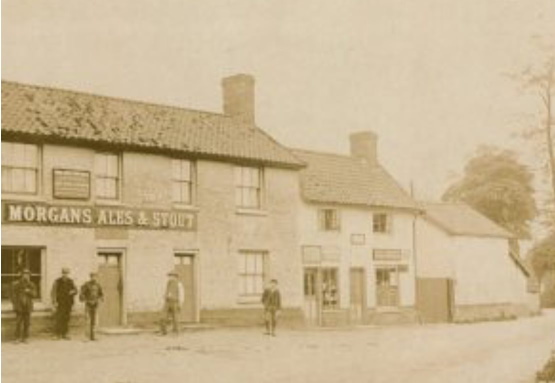
The Cottage with adjoining shop to the right of the Crown Public House. Postcard courtesy Carol Ewin
Parts I and II of a series of blogs, take the history of the cottage (with an adjoining shop), from around 1749 to 1868.
Here, we go forward from 1868 when Joseph Warren purchased the premises at auction. Later, he conveyed the property to his son Harry. In 1895 Harry Warren sold the property.
Joseph Warren
Born in Great Ellingham in 1831, Joseph Warren was a son of William Kiddle Warren and his wife, Elizabeth nèe Whittred.
His paternal grandfather was Thomas Warren. His maternal grandfather was John Whittred. Both Thomas Warren and John Whittred owned various properties in the village. Indeed, Thomas Warren also owned properties in Norwich.
Joseph’s Father, William Kiddle Warren
For the reasons I mention below, I think it unlikely that young Joseph and his two siblings spent much time with their father. More likely they spent time in the company of their grandfathers. Indeed at a young age, Joseph lived with his mother Elizabeth Warren and his two siblings at the home of his maternal grandparents, John and Elizabeth Whittred.
1841 census
The 1841 census captures 9 year old Joseph with his mother Elizabeth at the home of Elizabeth’s parents John and Elizabeth Whittred, in Great Ellingham. I have no doubt that their home was ‘Cemetery Farm’ in Long Street.
Joseph’s elder brother 12 year old Jeremiah and younger sister Elizabeth are not with their mother on census night. Jeremiah is with the household of schoolmaster Goodwin Kilburn in Hackford.
However I cannot ascertain the whereabouts of young Elizabeth at that time. Nevertheless I believe Joseph’s father, William Kiddle Warren, is with the household of James Brooks in Diss.
1844/1845
It may be that William Kiddle Warren and his wife Elizabeth were living apart. The following notice appeared in the Norfolk Chronicle of the 21st June 1845. It states that William Warren once lived in Heydon, Norfolk and (before 1845) in Hoxne.
It also indicates that William Warren was in financial difficulties.
W.K. WARREN’S Assignment
The Trustees of the Deed of Assignment dated the 15th January last, executed by WILLIAM KIDDLE WARREN, formerly of Heydon, in Norfolk, and then of Hoxne, in Suffolk, Farmer, being about to make a division of the assets in his hands, such of the creditors of the said W K Warren, as have not already executed the Deed, are requested to call at my Office and execute the same, on or before the 20th Inst., or they will be excluded from the benefit of the said Deed.
I.O. TAYLOR, Solicitor to the Trustee
St Giles Street, Norwich
20th June, 1844
I believe the reference to ‘Heydon’ is erroneous and it should read ‘Roydon’.
Just a few months earlier, the following notice was published in the Ipswich Journal of the 25th January 1845. This gives us further information concerning William Kiddle Warren’s circumstances:
HOXNE, Suffolk
NOTICE OF SALE
(Under a Deed of Assignment)
Mr GEO. W. SALTER
Begs to announce to the Public, that he has received instructions to dispose of by
PUBLIC COMPETITION
ALL the Valuable Live and Dead Farming Stock, HOUSEHOLD FURNITURE, and other Effects, upon the HOXNE PARK FARM, in the occupation of Mr William Kiddle Warren.
Further particulars of which will appear in next weeks paper.
A Conveyance Deed of 1845 relating to Joseph Warren’s paternal grandfather’s property, also gives William Kiddle Warren’s address as being ‘late of Roydon but now of the city of Norwich‘.
William Kiddle Warren Convicted of Fraud
Nevertheless just four years later, William Kiddle Warren found himself in further difficulties. He was convicted of fraud and was sentenced to transportation for 10 years.
In the event, he was not transported. On the 1st December, 1853, a licence for early release from the Stirling Castle Hulk Prison Ship moored off Devonport, Plymouth, was granted to William Kiddle Warren.
However, I do not know whether William Warren ever returned to Norfolk. Indeed, when William Kiddle Warren’s father Thomas Warren died in 1858, it seems that William Kiddle Warren was living abroad. In his will, Thomas Warren left a legacy to his son William Kiddle Warren ‘in case he shall come to England to claim the same’.
1851 census
The national head-count of 1851 finds 20 year old Joseph Warren with his siblings, 22 year old Jeremiah and 17 year old Elizabeth in Church Street, Great Ellingham. However, I do not know exactly where the siblings lived in Church Street.
Jeremiah is the head of the household and is described as a linen draper. Their 42 year old mother Elizabeth is living with her 76 year old mother, Elizabeth Whittred, in Long Street – presumably in the house which later became Cemetery Farm.
Joseph Marries Sarah Wilson
On the 22nd March, 1858, Joseph married Sarah Wilson at the General Baptist Church in March, Cambridgeshire. Just a week later, Joseph’s grandfather Thomas Warren died. Joseph along with his brother and sister, benefited from their grandfather’s will.
Death of Maternal Grandmother & Mother
Joseph’s maternal grandmother Elizabeth Whittred died in 1862. His mother, Elizabeth Warren, died the following year.
Following the deaths, Joseph inherited most, if not all, of his maternal grandfather’s property, including Cemetery Farm in Long Street.
However by this time, Joseph and his wife were living in East Dereham.
1861 census
The census for 1861 captures the fairly large household of Joseph Warren in Market Place, East Dereham.
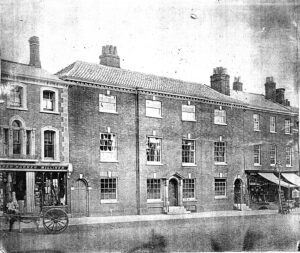
Left – Joseph Warren’s Draper Milliner shop. Centre – Cowper House
Courtesy Dereham Heritage Trust
29 year old Joseph is a general draper. With him is his 31 year old wife Sarah and their one year old son Joseph. Sarah’s brother, 26 year old draper Healey Wilson is also with Joseph and Sarah, along with two apprentice drapers, 18 year old John Wilson and 16 year old Anne Askew.
General servant 22 year old Sarah Goddard and nursemaid 13 year old Mary Towler complete the household.
Baptists
Joseph Warren regularly advertised for saleswomen either for general drapery or experienced in millinery – or both.
In an advertisement for an experienced sales-woman published in the Christian World on the 6th January, 1865, Joseph stated ‘Baptist preferred’.
I guess this is not surprising given that Joseph and Sarah married in a Baptist Church.
Children
Joseph and Sarah’s first child, Joseph John Wilson Warren, was born in 1859.
Joseph junior was followed by Sarah Elizabeth in 1862. However sadly the infant died within days (or weeks) of her birth.
Harry Whittred John Warren arrived in 1864, followed by Thomas Healey Kiddle Warren in 1866. Finally, Sarah Elizabeth in 1868.
Given that Joseph and Sarah included the names ‘Wilson’, ‘Whittred’ and ‘Kiddle’ in their sons’ names, I believe family was very important to the couple.
Joseph Warren Buys the Cottage in Church Street
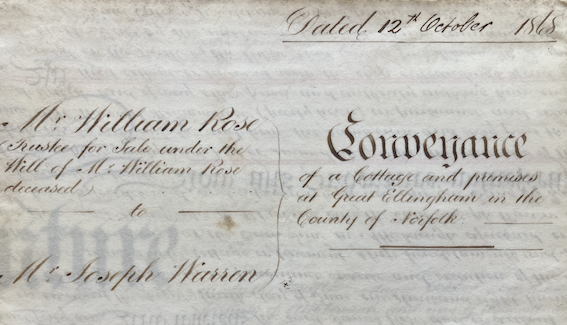
Extract from the Conveyance dated 12 October 1868 between the Executor of William Rose & Joseph Warren
Courtesy Sue Simpson
On the 12th October, 1868, Joseph Warren, a draper, of East Dereham completed his purchase of:
'ALL THAT cottage or tenement with shop outbuildings yard garden land and appurtenances thereto belonging situate and being in Great Ellingham aforesaid bounded on the North by the public road leading from Watton to Deopham and Rockland on the South by land now or late belonging to the Executors of Jonathan Rivett deceased on the East by the messuage or tenement or inn commonly called or known by the name of “The Crown” and on the West by the Wesleyan Chapel in Great Ellingham aforesaid as the said Cottage hereditaments and premises are now in the occupation of James Dye ……'
The property had been owned by the Rose family since William Rose purchased it in 1819. Although William Rose died in 1841, his wife Amelia had a life interest in the property. Accordingly, it was not sold until after her death in 1868.
1871 census
The 1871 census captures 37 year old Great Ellingham born general draper Joseph Warren in Market Place, East Dereham. With Joseph is his 42 year old wife Sarah and three young children – Harry 7, Tom 4 and Sarah 2.
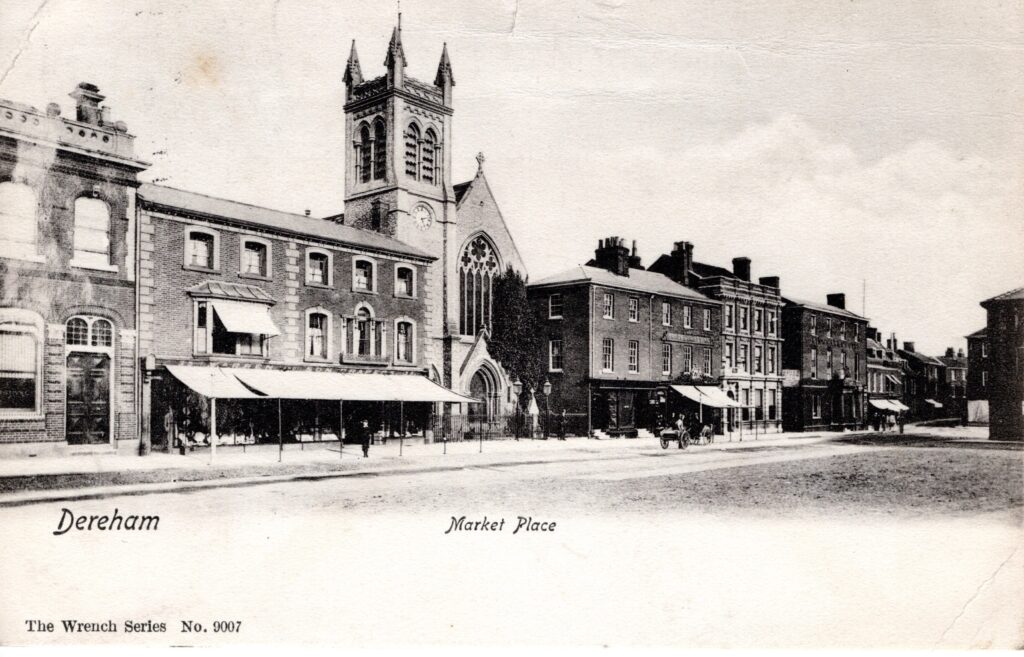
Market Place, Dereham. Joseph Warren’s shop to the left of Cowper Church with tower c1900-05
Courtesy Dereham Heritage Trust
Joseph’s establishment was large as the household also includes two drapery assistants, three apprentices and three servants.
Occupier James Dye
At the time of his purchase of the cottage with the shop in Great Ellingham, it was (or had been) occupied by James Dye. However it appears that by 1871, grocer James Dye had moved to Hingham.
Given that it is difficult to establish exactly where the individual households were in Church Street, I cannot be certain who occupied Joseph Warren’s premises following his purchase.
1877
Nonetheless in 1877, Joseph Warren advertised the property for sale (or let) in the Norfolk News of the 1st September:
GREAT ELLINGHAM, near Attleborough To be SOLD or LET, a Freehold DWELLING-HOUSE and Small SHOP, stabling, and an extensive Yard, adjoining the Crown Inn - For particulars apply to Joseph Warren, East Dereham
At the same time, Warren also advertised for sale a freehold eight-roomed dwelling-house and shop 15ft x 30ft in East Dereham. The premises which had a walled-in yard was then used as an ‘Eating House’.
In the event, the Great Ellingham property did not sell.
Tenant Henry Warren
Although I cannot be absolutely certain, at the time of the national head-count in 1881, I believe the property was occupied by saddler Henry Warren and his family.
The census captures 31 year old Henry Warren with his 34 year old wife Matilda and their children Agnes 4, John 3 and infant Ada at a shop in Church Street. Henry is described as a harness maker and shopkeeper.
The household also includes 55 year old widow Phebe Dyer described as a ‘nurse’ (I assume a ‘monthly nurse’ employed by Henry to look after Matilda and the newborn Ada), along with 15 year old servant Rebecca Church.
I believe this Warren family continued to live at the property until they moved to premises at the junction of Chequers Lane, Church Street and Long Street before 1901.
In the meantime, the property continued to be owned by Joseph Warren and then by his younger son, Harry John Whittred Warren.
1885 Joseph conveys the Cottage & Shop to his son

Extract from Indenture dated 6th January 1885 between Joseph Warren and Henry John Whittred Warren
Courtesy Sue Simpson
On the 6th January, 1885, Joseph Warren formally conveyed his cottage and shop adjoining The Crown to his youngest son, Harry John Whittred Warren. Then approaching his 21st birthday, Harry was still living with his parents in East Dereham. He was also working as a draper’s assistant for his father.
No money passed between father and son. The Conveyance Deed shows the consideration as ‘the natural love and affection’ that Joseph Warren had for his son.
In a nutshell, Joseph gifted the property to Harry.
As mentioned, I believe that the property continued to be occupied by harness maker Henry Warren. Unfortunately, the Deed conveying the property to Harry Warren does not mention any occupier.
December 1886 – Correspondence from Cann & Co.
On the 15th December 1886, the owners of the Crown Inn wrote to Joseph Warren at Market Place, East Dereham.
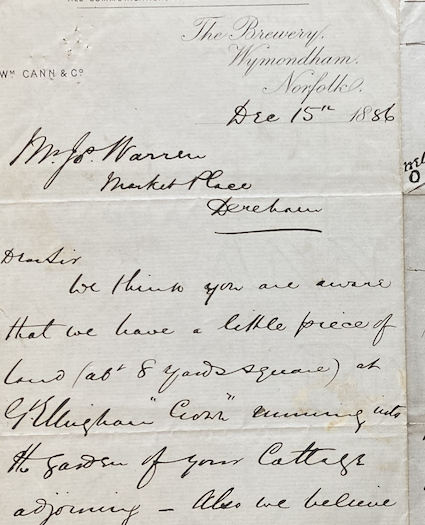
Extract from a letter dated 15th December 1886 from Wm Cann & Co. to Joseph Warren
Courtesy Sue Simpson
Wm Cann & Co. put forward a suggestion that Joseph Warren and his tenants ‘give up’ a right of way at the back of the Crown Inn in exchange for a small piece of land (8 yards square) belonging to the Crown. This piece of land adjoined the rear of the garden to the cottage.
The right of way allowed Warren and his tenants to access the well to the east of the Crown.
In his response three days’ later, Joseph Warren pointed out to Wm. Cann & Co. that the cottage belonged to his son. However, he had been managing the property.
He also pointed out that the piece of land being offered in exchange for the giving up of the right of way, was considerably smaller than Cann & Co. suggest. Warren also requested clarification with regard to the proposed new route of access to the well.
It appears that Cann & Co’s suggestion did not proceed at this time.
1891 Further Correspondence
On the 13th February, 1891, William Skelton for Wm Cann & Co. again wrote to Joseph Warren. This time the correspondence referred to the repair of the top of the well.
In the letter, reference is made to the earlier suggestion of Cann’s ‘giving’ a piece of land in exchange for Warren relinquishing the cottage’s right of way to the well. The content of this letter suggests that Joseph Warren considered that Cann & Co. had more to gain.
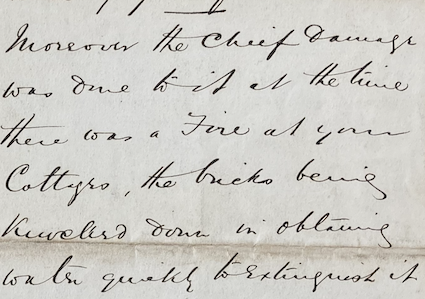
Extract from a letter dated 13 February 1891 from Wm Cann & Co to Joseph Warren
Courtesy Sue Simpson
In relation to the expense of the repair to the well top, William Skelton pointed out that the well is:
‘for the joint use of your 2 tenants and our one and we really think it is only fair you should pay half the expense’
Skelton (for Cann & Co) went on to say that:
'Moreover the chief damage was done to it at the time there was a fire at your Cottages, the bricks being knocked down in obtaining water quickly to extinguish it’
I do not know the outcome of either issue – the question of the right of way to the well or the sharing of the expense of the repair.
However, what the letter does tell us is that at that time Warren’s property comprised two cottages or premises with two separate tenants. Further, there had been a fire at the cottages.
Tenant William Wilkins
In addition to saddler Henry Warren, I believe postmaster and grocer William Wilkins and his family now occupied Harry Warren’s cottages which adjoined The Crown.
Although at the time of the 1881 census, this Wilkins family lived in Church Street, I believe it was a different property.
Historical maps show that certainly around the 1880s, the ‘Post Office’ was once at the nearby property which later became ‘Ye Olde Thatche Shoppe‘. However by the 1890s, the Post Office was at the shop and cottage (or cottages) owned by Harry Warren.
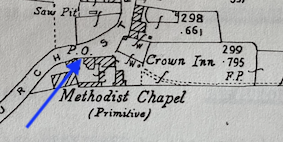
Map showing the position of the Post Office (P.O.) at the premises adjoining the Crown Inn. Map contained with private deeds collection Courtesy Adrian & Sue Carlton
The 1891 census captures 47 year old William Wilkins with his 43 year old wife Ann Amelia and their 6 children living in a four-roomed dwelling in Church Street. Their children are Walter 20, Ellen 13, Mary 10, Emma 8, Ann Maria 6 and Lewis Bertie aged 5.
Ten years earlier, William Wilkins worked as a butcher. However now he is the village’s postmaster as well as a grocer. His son Walter is now employed as a butcher. William’s wife Ann Amelia is a maker of straw bonnets. Apart from Ellen (who has no occupation), the younger children are all attending school.
Harry J W Warren
Meanwhile, the premises continued to be owned by Joseph Warren’s son, Harry.
In 1891, Harry is still living with his parents and working for his father in East Dereham.
Emigration & Sale of the Cottage & Shop at Great Ellingham
However within four years, Harry had left England for New York. He had also sold his premises adjoining the Crown Inn, Great Ellingham.
On the 9th December, 1895, Harry John Whittred Warren of New York City in the United States of America, completed his sale of the cottage and shop to Charles Drake of Great Ellingham.
The history of the cottage and shop adjoining the Crown Inn continues with Charles Drake in Part IV.
Meanwhile, we continue with the story of Harry Warren.
The 1895 Conveyance Deed gives Harry’s occupation as a photographer.
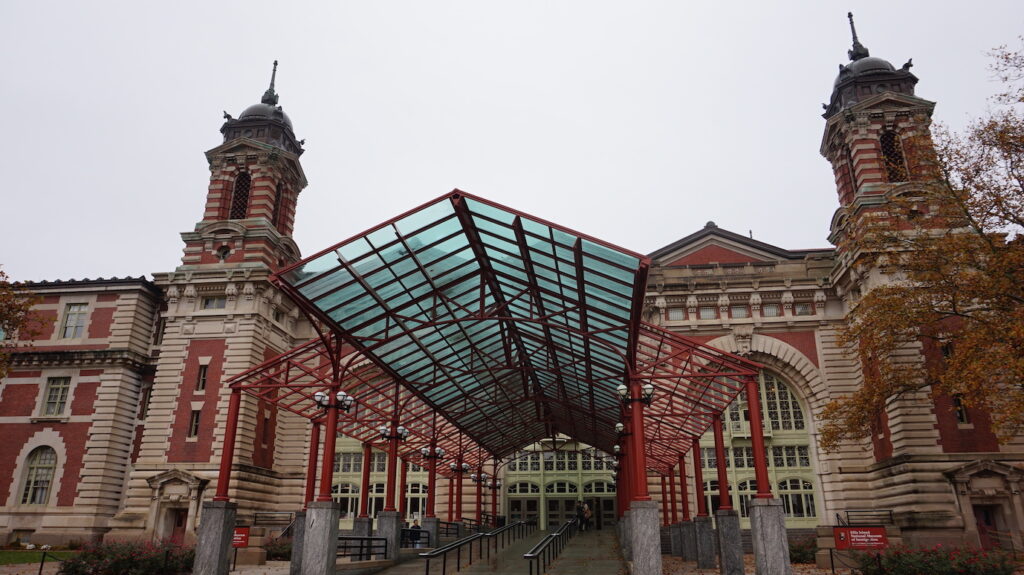
Ellis Island Immigration Centre. Photograph taken by author November 2018
Just over a month earlier, 30 year old photographer Harry Warren together with his six pieces of luggage, boarded the RMS Etruria at Liverpool. He arrived at Ellis Island Immigration Centre, New York on the 11th November, 1895.
Death of Joseph Warren
We can but wonder whether Harry ever saw his father again. Joseph Warren died in East Dereham on the 9th January, 1900.
From New York to Balitmore
Around five years’ later, the New York U.S. State Census of 1905 captures 40 year old Harry J Warren born in England with his American born wife Maud in West 69th Street, Manhattan, New York. I am confident that this is Harry Warren the son of Joseph Warren.
Five years’ later, the 1910 United States Federal Census finds 46 year old Harry J Warren in the St Agnes Hospital, Baltimore, Maryland. At the time, St Agnes was a sanatorium for patients with a mental illness or drug addiction.
The census confirms that Harry J Warren had been married for 12 years but had no children.
Harry Warren returns ‘Home’
At some point, Harry returned ‘home’ to England. He died just outside Cambridge on the 7th January, 1918.
The Norwich Mercury of 13th January, 1900 included a report of the funeral.
The newspaper stated that Mr Harry John Whitehead Warren was ‘of the well-known’ family of Warren of Dereham‘. It also confirmed that the chief mourners were Harry’s brother and sister-in-law, ‘Mr and Mrs J Warren’, and his brother-in-law and sister, ‘Mr and Mrs Gunter’ [Gunther].
Sources:
Private Deeds Collection. Sue Simpson
1841 census HO107/781/8, HO107/763/12, HO107/758/5
1851 census HO107/2823/132
1861 census RG9/1242/35
1871 census RG10/1846/49
1881 census RG11/1974/92, RG11/1974/96
1891 census RG12/1549/79A, RG12/1554/36
1901 census RG13/1867/79, RG13/1872/39
1911 census RG14/11473/114
21 June 1845 Norfolk Chronicle
25 January 1845 Ipswich Journal
26 June 1858 Cambridge Chronicle & Journal
6 January 1865 Christian World
1 September 1877 Norfolk News
13 January 1900 Norwich Mercury
Newspapers viewed via The British Newspaper Archive website
20 December 1845. Conveyance. Thomas Warren & William Kiddle Warren to Benjamin Barnard. Bury Hall Private Deeds Collection. Emma Wilson
1853 Licence number 206: William Kiddle Warren. Licence Granted 1 December 1853, for early release from Stirling Castle hulk prison. The National Archives, Kew. Ref: PCOM 3/3/206
1859 Probate & Will of Thomas Warren. Obtained and downloaded from Find a Will service. https://probatesearch.service.gov.uk/#wills 14.07.2020
Great Ellingham Parish Registers. Norfolk Record Office. PD 609. Also available via www.familysearch.org
GRO Index. Also available via FreeBMD website
Private Deeds Collection. David & Julia Matthews
New York State Archives; Albany, New York; State Population Census Schedules, 1905; Election District: A.D. 19 E.D. 14; City: Manhattan; County: New York; Page: 12. Ancestry.com. New York, U.S., State Census, 1905 [database on-line]. Provo, UT, USA: Ancestry.com Operations, Inc., 2014. www.ancestry.co.uk
The National Archives and Records Administration; Washington, D.C.; Passenger and Crew Lists of Vessels Arriving at and Departing from Ogdensburg, New York, 5/27/1948 – 11/28/1972; Microfilm Serial or NAID: M237, 1820-1897. Ancestry.com. New York, U.S., Arriving Passenger and Crew Lists (including Castle Garden and Ellis Island), 1820-1957 [database on-line]. Lehi, UT, USA: Ancestry.com Operations, Inc., 2010.
Year: 1910; Census Place: Election District 13, Baltimore, Maryland; Roll: T624_552; Page: 2b; Enumeration District: 0054; FHL microfilm: 1374565. Ancestry.com. 1910 United States Federal Census [database on-line]. Lehi, UT, USA: Ancestry.com Operations Inc, 2006.